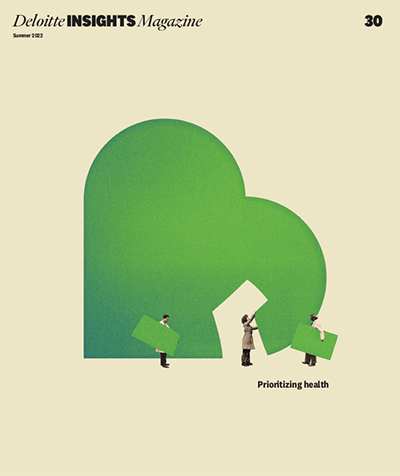Because our choices are profoundly shaped by their context—by what our friends, family, colleagues, and communities do—the impact of an individual action can extend beyond the immediate effect, subtly influencing the behaviors of those around us. In fact, research on social movements and change suggests that a relatively small number of dedicated individuals can catalyze much wider and more rapid shifts in the broader environment.2
In the aggregate, such social contagion effects can have dramatic impacts on attitudes and behaviors, as seen on issues such as smoking and marriage equality.3 That’s why personal efforts toward living a more sustainable life matter. It’s less about the individual emissions avoided by walking rather than driving and more about the example the act sets for others.
So how do we build societal support for a low-carbon transformation?
We’ve created the Deloitte Sustainable Actions Index to help answer that question. Our goal is to understand what inspires individual and collective action on sustainability-oriented behaviors. This analysis can be applied to understand how close (or not) we might be to societal tipping points in behaviors and identify the levers companies and governments can use to both respond to, and encourage, the broader adoption of pro-climate norms. It is part of an ongoing effort to look at individual sustainability efforts in new ways, centered around how companies, governments, and civil society can catalyze the rapid adoption of more sustainable practices by people. This is the first in what will be a series of studies exploring different applications of these ideas.
Constructing the Sustainable Actions Index
To better understand the individual and collective roles that people play in addressing climate change and sustainability, we asked respondents to Deloitte’s Global State of the Consumer Tracker 4 about how sustainability factored into three dimensions of their lives.
Because people are multifaceted, there are inherent tensions and tradeoffs in the lives of even the most sustainability-minded among us. That’s why the survey was designed to gain insight into how sustainability is shaping respondents’ actions in a variety of ways: in their personal choices, their civic participation, and in their workplace. The approach allows us to see how different demographic characteristics and beliefs manifest differentially in behaviors across people’s lives. Younger people tend to be more engaged with sustainability across the board, for example, but they are especially active in the political sphere. We may dutifully recycle at home but take dozens of flights for business travel. We may urge our employer to do away with single-use plastics but support political candidates who oppose policies to address climate change.
Understanding these tensions and tradeoffs could enable leaders to better manage risks and identify ways to catalyze bolder, faster action. As a diverse set of stakeholders increasingly demands climate action, leaders can understand where, how, and from whom “people pressure” to do more on climate change and sustainability could manifest and intensify. And it can allow them to craft strategies and appeals to help accelerate action and potentially shift behavior in ways that are tailored to how particular groups are enacting sustainability in different areas of their lives.
We addressed the three main spheres—home, workplace, and community—in a series of questions around personal choices, workplace concerns, and citizen actions, as described below.
- Personal choices, covering matters that are more directly under individual control as part of daily habits and purchasing decisions. These questions asked about the sustainability choices people are making on a day-to-day basis. Do they recycle or compost? Have they taken measures to reduce energy usage or get their energy from renewable sources? Have they walked or cycled rather than using a personal car? Have they considered, or bought, an electric vehicle? Do they try to buy more locally, avoid or consume less meat, or choose more sustainable products?
- Workplace concerns related to people’s engagement with sustainability at their jobs. We asked questions about people’s expectations of their employer’s sustainability actions, how a potential employer’s position on sustainability would factor into their decision to accept a job, and if people would consider changing jobs to work for a more sustainable company.
- Citizen actions, about a person’s likelihood of voting for a candidate who supports climate change actions; their support of regulations aimed at climate protection; their participation in climate protests or demonstrations; and if they have talked to public officials or their friends and family about climate change and the environment.
We asked these and additional questions of 23,000 respondents in 23 countries in September 2021. Responses were concentrated in North America, Europe, and East and South Asia.
To construct the Sustainable Actions Index, we then synthesized responses to questions corresponding to each of these three pillars and divided by the number of items (varied by respondent depending on nonresponses to specific items) and multiplied, resulting in a unique score on each dimension of the index. Respondents were then divided into three groups based on their index scores’ deviation from the mean: behavioral bystanders (low), the movable middle (medium), and sustainability standard-setters (high), respectively.
















